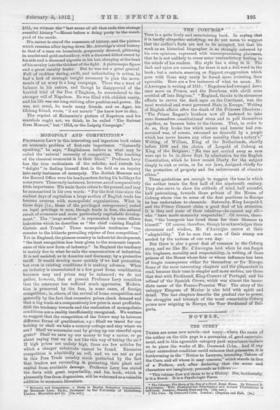THE 0013112,GS: 41 ' Tills is a quite lively and entertaining book.
In saying that it is hardly altogether satisfying, we do not mean to suggest that the author's facts are not to be accepted, but that his work as an historical biographer is se strongly coloured by his own opinions, expressed with uncompromising plainness, that be is not unlikely to rouse some contradictory feeling in the minds of his readers. Ms style has a sting in it. The dash and spice are amusing, for there is not a dull word in the book; but a certain sneering or flippant exaggeration which goes with these may easily be found more irritating than agreeable. Here are a few instances of what we mean. Mr. d'Auvergne is writing of 1815: " Napoleon had swooped down once more on France, and the Bourbons with shrill cries scuttled off into Belgium." "England, thanks to its strenuous efforts to revive the dark ages on the Continent, was the most wretched and worst governed State in Europe." Writing of English affairs after the death of the Princess Charlotte : " The Prince Regent's brothers now all hastened to take unto themselves constitutional wives and to pull themselves together, as became heirs to the throne. That, in order to do so, they broke ties which nature and honour had con- secrated was, of course, esteemed no discredit by a people which has never known any other morality than a notary's." Writing of William, King of the Netherlands, shortly before 1830 and the choice of Leopold of Coburg as King of the Belgians : " He was not carried away as men were apt to be in those days by admiration for the English Constitution, which he knew meant liberty for the subject simply to sink or swim, or for our laws, designed chiefly for the protection of property and the enforcement of obsolete e thice ," These quotations are enough to suggest the tone in which the author treats the first half of the nineteenth century.. They also serve to show his attitude of mind, half scornful, half patronizing, towards those princes of the House of Coburg whose rise to some of the first positions in Europe he has undertaken to chronicle. Naturally, Xing Leopold L and the Prince Consort claim a good deal of his attention. It is they and some of their relatives—he cannot say all— who " have made monarchy respectable." Of course, there- fore, "the bourgeois has loved them for their likeness to himself." Of course, therefore, though lie acknowledges their cleverness and wisdoms Mr. crA.uvergne sneers at their " adaptability." Yet he sees that men of their stamp are needed by the nations of our own day.
But there is also a great deal of romance in the Coburg story, and we like Mr. d'Auvergne best when ho can forget his bugbears, morality and respectability, in writing of those princes of the House whose fate. or whose influence has been of tragic) consequence either for themselves or for Europe. Some of the most interesting chapters and the plCasantest to read, because their tone is simpler and more serious, are those that deal with Ferdinand, Xing-Consort of Portugal, and his refusal of the Spanish Crown, which was almost the imme- diate cause of the Franco-Prussian War. The story of the unhappy Empress of Mexico is also told with spirit and detail. The last chapters describe the gradual rise to power, the struggles and triumph of the Most remarkable' Coburg prince now reigning in Europe, the Tsar Ferdinand of Bul- garia.










































 Previous page
Previous page